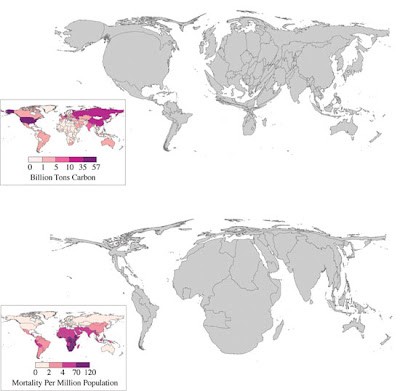More on the Ethics of Climate Change

I have repeatedly said that the most serious moral issue involved in climate change is that the real burdens of the effects of climate change fall on the poorest of the poor--who did not benefit from the wealth created by the emissions of greenhouse gases in the past. There is a new study that reinforces my point:
The public health costs of global climate change are likely to be the greatest in those parts of the world that have contributed least to the problem, posing a significant ethical dilemma for the developed world, according to a new study.
In a paper to be published the week of Nov. 12, 2007, in the journal EcoHealth, a team of researchers led by environmental public health authority Jonathan Patz of the University of Wisconsin-Madison reports that the health burden of climate change will rest disproportionately on the world's poor.
"Our high consumption of energy is putting a huge disease burden on places that are quite remote from us," explains Patz, a professor in the UW-Madison School of Medicine and Public Health and the Nelson Institute for Environmental Studies. "There are many serious diseases that are sensitive to climate, and as earth's climate changes, so too can the range and transmission of such diseases."
. . .
The authors quantify the ethical dimension of global climate change by measuring per capita carbon emissions and comparing that data with climate-related disease burden for the most affected regions of the world. The results show a stark contrast between those populations causing global warming from those suffering the brunt of the impacts.
Americans, for example, have carbon outputs six times the global average, but a significantly lower relative risk for the health effects of climate change.
Changes in patterns of diseases and other negative outcomes of a warming world, argues Patz, suggests the developed world must begin "to pursue equitable solutions that first protect the most vulnerable population groups..."
"Many of these climate-sensitive diseases, such as malaria, malnutrition, and diarrhea, affect children," he explains.
"We in the developed world need to recognize how our way of life imposes negative impacts upon poorer nations of the world -- especially their children."
Read it all here. Read the University of Wisconsin press release here.
A Note About the Maps: The two world maps schematically represent the contribution of different nations to global warming, as measured in atmospheric carbon output (top) and the health effects of global warming as measured in mortality for diseases and other effects of a warming world climate (bottom).

Comments